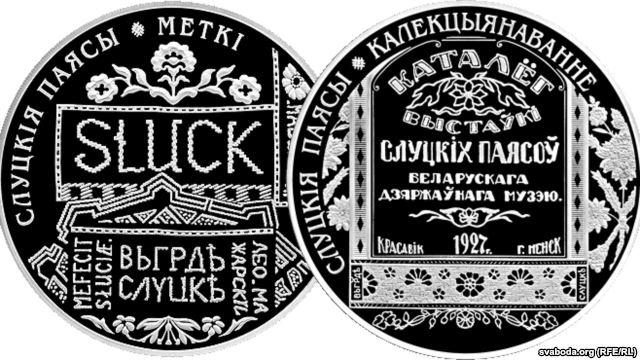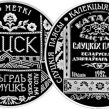
Increasingly Broad-Based Expressions of Belarusian Nationalism
Publication: Eurasia Daily Monitor Volume: 11 Issue: 12
By:

A flurry of pronouncements about a Belarusian “national idea” has continued. Unusually, however, it is not only opposition-minded Belarusians who are now talking publicly about what it means to be a Belarusian; President Alyaksandr Lukashenka has weighed in on this topic as well (see EDM, January 16). Last week (January 17), Oleg Gaidukevich, vice chairman of the Liberal Democratic Party (LDP) and a son of this party’s chairman, joined the public conversation by stating that “the country needs healthy nationalism.” LDP, once thought of as a clone of the eponymous Russian party headed by Vladimir Zhirinovsky, is a shadowy institution that calls itself part of the opposition but is definitely not pro-Western. The mention of “healthy” nationalism is essential in the normative public context, in which “nationalism” is almost invariably construed as xenophobia, not as benign attachment to a certain national community—hence Gaidukevich’s statement that “one should not be afraid of this word.” Gaidukevich makes it a point that if somebody considers Kastus Kalinowski a 19th century national hero whereas somebody else believes that Belarus began with the proclamation of the Belarusian Soviet Socialist Republic in 1919, these different takes on Belarus’s history should not divide Belarusians (https://bdg.by/news/politics/27643.html).
To be sure, Kalinowski was an ardent Catholic active in the 1863 Polish uprising against Russian domination and willing to establish a national home for Belarusians within a reestablished Poland. Ironically, Kalinowski was popularized by Soviet secondary school history textbooks as the leader of the Belarusian peasant uprising. Understandably, he became known as the author of several appeals taken out of context, whereas the newspaper he edited (The Peasant’s Truth)—and where his actual ideology was on full display—was never publicized in the Soviet Union. This is the point made by Aleg Latyshonak, a Belarusian historian from Bialystok, Poland. According to Latyshonak, “to be a Belarusian is a declaration. If anybody declares himself or herself a Belarusian, then he or she is. So I do not deny Belarusianness to anybody who identifies that way.” Moreover, “notions of Belarusianness and what it means to be a Belarusian are so diverse that no single denominator can be found, unlike in the case of typical European nations” (https://www.svaboda.org/content/article/25229599.html). What is interesting is that both Gaidukevich’s and Latyshonak’s pronouncements about Belarusians are along the lines of civic, not ethnic nationalism. In other words, it is a common experience of living within Belarus that is creating Belarusians, not a self-conscious ethnicity demanding its own state, as used to be the case everywhere else in Eastern Europe.
Nevertheless, language as the primary marker of ethnicity also continues to haunt the minds of opinion makers. Thus, the associates of the publication Belorusskie Novosti toured the streets of Minsk to ask random pedestrians, “Why do you not speak Belarusian?” Here is the assortment of published responses. “Because all the people surrounding me speak Russian and the same is the case in the university. So one has to talk in Russian whether you want it or not, whereas Belarusian is being gradually forgotten.” “I do speak Belarusian when someone approaches me in Belarusian. I am in favor of Belarus where everyone speaks their native language.” “I cannot speak it well. My vocabulary is small, as I was not taught Belarusian in my childhood.” “I speak Belarusian but very seldom. It is accepted in our society to use Russian. If more people communicated in Belarusian, I would probably be drawn to that as well.” “I can speak Belarusian well, but there is nobody to use it with. When I try, people do not understand me” (https://naviny.by/rubrics/society/2014/01/17/ic_media_video_116_8269/).
Against the backdrop of this vicious circle (I will only speak Belarusian when everybody else does), it is all the more noteworthy that in November 2013, Belarus minted two coins, one worth 20 rubles and the other 1 ruble (a minuscule sum considering that 9,607 rubles equals $1) with inscriptions in Belarusian Tarashkevitsa and in Belarusian Lacinka, devoted to Slutsk Belts, elements of the nobility’s attire in the Grand Duchy of Lithuania (nn.by/?c=ar&i=121033?). Tarashkevitsa is an orthography named after Bronislav Tarashkevich, the creator of the first standardization of the Belarusian language in the early 20th century. This orthography was subsequently delegalized by the language reform of 1933. Since that time, Tarashkevitsa has been perceived as a symbol of Belarus leaning to the West. Lacinka is the Belarusian Latin alphabet that was used (alongside the Cyrillic alphabet) by the first ever Belarusian newspaper Nasha Niva (1906–1915) published in Vilnius. Lacinka was abandoned in Soviet Belarus. Using Tarashkevitsa and Lacinka on coins minted in 2013 may be construed as an expression of Belarus’s growing detachment from the Russian world.
This detachment, of course, can hardly be noticed in the areas of the Belarusian economy or in domestic politics. For example, some experts suggest that Lukashenka and Belarus’s alleged victory in the potash war with Russia was actually Pyrrhic. It appears that whereas the Russian potash producer Uralkalii has increased its output and export since the collapse of the joint Russian-Belarusian potash trader in late 2012, Belaruskalii, the Belarusian potash producer, has done the opposite in part because it is the Russian ex-partner that controls the export network (https://naviny.by/rubrics/economic/2014/01/18/ic_articles_113_184287/). Also, the sale of some major Belarusian assets to Russia by the end of 2014 is perceived as a near certainty by the Belarusian Institute for Strategic Studies (https://belinstitute.eu/sites/biss.newmediahost.info/files/attached-files/BISS_FPI17_2013ru_0.pdf).
In the area of domestic politics, some leading experts, like Yury Zisser, the owner of Belarus’s most visited internet news portal, share an observation that a considerable expansion of access to the Internet (to 4.86 million people in a country with the total population of about 9.5 million) in Belarus has not become a vehicle of its democratization. Zisser believes that expectations of that kind were groundless illusions to begin with. A demand for change should come from within Belarusian society, and no means of communication can facilitate this demand by itself (https://naviny.by/rubrics/computer/2014/01/19/ic_articles_128_184297/).
It then appears that Belarus watchers should stock up on strategic patience. Even so, the actual situation in and around Belarus is far from hopeless, which is how it is usually described by the Western media.




